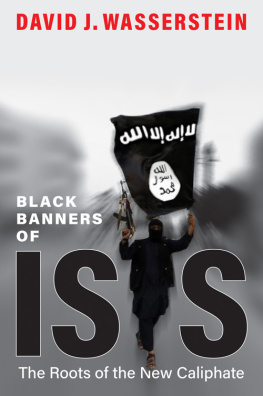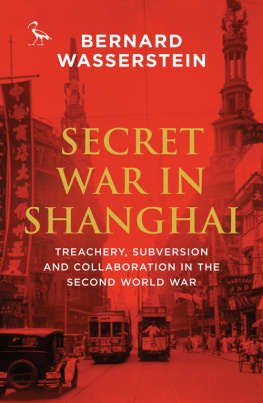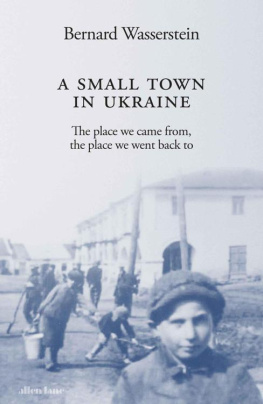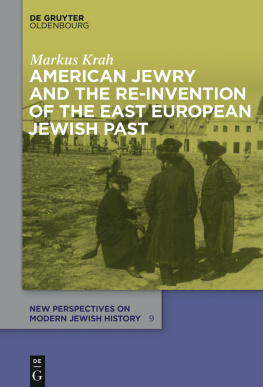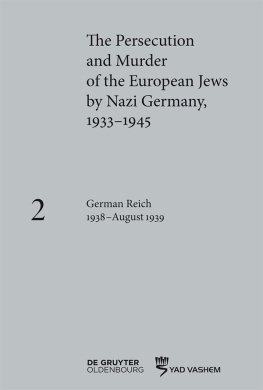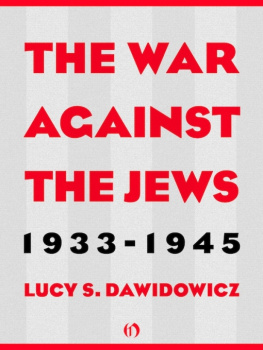
BY THE SAME AUTHOR:
The British in Palestine
Britain and the Jews of Europe 19391945
The Secret Lives of Trebitsch Lincoln
Herbert Samuel
Vanishing Diaspora
Secret War in Shanghai
Divided Jerusalem
Israelis and Palestinians
Barbarism and Civilization
ON THE EVE
THE JEWS OF EUROPE BEFORE THE SECOND WORLD WAR
Bernard Wasserstein

First published in Great Britain in 2012 by
PROFILE BOOKS LTD
3a Exmouth House
Pine Street
London EC1R 0JH
www.profilebooks.com
First published in the United States of America in 2012 by
Simon & Schuster, Inc.
Copyright Bernard Wasserstein, 2012
10 9 8 7 6 5 4 3 2 1
Designed by Akasha Archer
Maps by Paul J. Pugliese
Printed and bound in Great Britain by
Clays, Bungay, Suffolk
The moral right of the author has been asserted.
All rights reserved. Without limiting the rights under copyright reserved above, no part of this publication may be reproduced, stored or introduced into a retrieval system, or transmitted, in any form or by any means (electronic, mechanical, photocopying, recording or otherwise), without the prior written permission of both the copyright owner and the publisher of this book.
A CIP catalogue record for this book is available from the British Library.
ISBN 978 1 84668 180 6
eISBN 978 1 84765 345 1
The paper this book is printed on is certified by the 1996 Forest Stewardship Council A.C. (FSC). It is ancient-forest friendly. The printer holds FSC chain of custody SGS-COC-2061

To Shirley
The historians essential creative act is the resurrection of the dead.
Simon Dubnow
CONTENTS
LIST OF MAPS
Note on Transliterations and Place-names
In general, I have used the standard Encyclopaedia Judaica and YIVO systems for transliterations from Hebrew and Yiddish respectively. But I have not hesitated to diverge from these where it seemed sensible. Believing with T. E. Lawrence that scientific systems of transliteration are helpful mainly to those people who know enough not to need helping, but a washout for the world, I have tried in this sphere to do what will be most helpful to the English-speaking reader without worrying unduly about the hobgoblin of consistency.
GLOSSARY
badkhn (Yid.)/badkhan (Heb.) jester and master of entertainments at weddings
badkhones the repertoire and performance of the badkhn
besmedresh (Yid.)/bet hamidrash (Heb.) study hall
bris (Yid.)/brit (Heb.) circumcision
dybbuk an evil spirit
Evsektsiia Jewish sections of the Soviet Communist Party
get religious bill of divorce
gymnasium academic high school
hachsharah (pl. hachsharot) (lit. preparation), training farm
halachah Jewish law
halutz (pl. halutzim) (Zionist) pioneer (in the Land of Israel)
Hasidism popular religious movement, founded in the eighteenth century, with a large following in eastern Europe (hence Hasid, Hasidim)
haskalah Jewish Enlightenment
hazan cantor
heder (pl. hadorim) religious elementary school
humash Pentateuch
kaddish prayer for the dead
kapote long black, generally gaberdine coat
kehillah (pl. kehillot) community
korenizatsiia nativization/indigenization (policy in USSR in 1920s)
luftmensh (Yid.)/Luftmensch (Ger.) lit. man of air, impractical person with no definite occupation or visible source of income
magid wandering preacher
matzah (pl. matzot) unleavened bread (eaten at Passover)
melamed (pl. melamdim) teacher
mezuzah (pl. mezuzot) door amulet, encased parchment containing holy writ
mikveh (pl. mikvaot) ritual bath
minyan quorum of ten adult males required for Jewish prayer
misnagdim opponents (of Hasidism)
mitzvah (pl. mitzvot) commandment, good deed
mohel (pl. mohalim) ritual circumciser
nigun tune
rebbe leader of a Hasidic sect
seder festive Passover dinner
Sejm lower house of Polish parliament
semikhah rabbinic ordination
shames (Yid.)/shamash (Heb.) sexton of a synagogue
shechitah kosher meat slaughter
shochet kosher slaughterer
shtetl (pl. shtetlakh) small town
shtibl (pl. shtiblakh) Hasidic conventicle
shund trash (esp. literary or theatrical)
soyfer (Yid.)/sofer (Heb.) scribe
talmud torah religious school
tefillin phylacteries
tish table (esp. at the court of a Hasidic rebbe)
Torah Pentateuch, the Hebrew Bible, the body of Jewish law
tsedoko (Yid.) charity/tsedakah (Heb.)
yeshiva (pl. yeshivot) talmudical college
yeshiva bokheryeshiva student
INTRODUCTION
A specter haunted Europe in the 1930sthe specter of the Jew. Simultaneously feared and despised as a Christ-killer, a devil with horns, subversive revolutionary and capitalist exploiter, obdurate upholder of an outmoded religion and devious exponent of cultural modernism, the Jew was widely regarded as an alien presence. Increasingly excluded from normal society and extruded from common human fellowship, the Jew was transmogrified from fellow citizen into bogey, a subhuman, at best an inconvenience, eventually almost everywhere a hunted beast. Even before the outbreak of the Second World War, this was true not just in those areas of Europe already directly ruled by the Nazis but over the greater part of the continent.
In the 1920s the European Jews had presented the appearance of a vibrant, dynamic, and flourishing people. For the first time in their history they were recognized as citizens in every country in which they lived. Especially in western Europe and the Soviet Union, an ambitious, meritocratic middle class was rapidly climbing the social ladder. The best-educated ethnic group in Europe, Jews shone in all fields of science, dazzled in the theater and literature, and constituted the beating heart of musical life. But this book does not rehearse what are often called the contributions of Jews to European culture and society in this period. That is a familiar story.
Within the short space of two decades a dramatic change transformed the Jewish position. By 1939, two years before the Nazi decision to commit genocide, European Jewry was close to terminal collapse. In much of the continent Jews had been deprived of civil rights and were in the process of being turned into outcasts. The demographic outlook was bleak, heading in a downward spiral toward what some contemporaries forecast would be race suicide. The great mass of Jews in east-central Europe were sunk in dire povertyand sinking further into total immiseration. A nation of shopkeepers, the Jews found themselves superfluous men, both in a Soviet Union that had abolished the marketplace and in militantly nationalistic states that complained of Jewish dominance of it. The USSR at least allowed the Jew to change from
Next page

